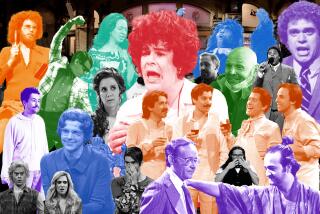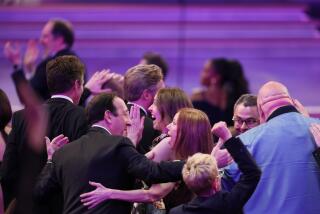Taking the heat for icebreakers
As millions of viewers around the globe sit down to watch the Oscar broadcast, they must brace themselves for what is often the rockiest part of any televised award ceremony: the scripted exchanges usually shared by a pair of mismatched celebrities at the podium before envelopes are opened and trophies are handed out. The presenters squint to read the teleprompter; they struggle to deliver the simplest of jokes, often with an air of unaffected cool, at best -- or, at worst, downright contempt.
Known in the industry as “patter” (or “banter”), these sometimes funny, sometimes painful moments don’t get the glory that is often showered upon the host’s monologue. By nature, patter is not allowed to be as cutting. It’s inherently inoffensive; it has to be to be approved by stars who often take themselves very seriously. But patter is a necessary award show evil dreamed up by comedy scribes who would probably rather be writing their spec script, delivered by performers who often resent having to say it, and received by an audience that just wants to get on to the acceptance speech.
At heart, patter is pure exposition -- and, as any screenwriter will tell you, exposition is death. The trick is for the patter-writer to key into a celebrity’s essence, to somehow capture his or her voice and persona in a streamlined, 60-second vignette. It must seem effortless and tossed off, yet deliver a strong punch. Think of patter as comedic haiku.
Yet each year, when Oscar time rolls around, someone spins comedic gold out of babble. A joke is delivered with an unexpected level of panache. A celebrity you never believed could be funny is self-deprecating and casual enough to make you believe his carefully crafted zinger was an off-the-cuff comment. That rare moment demonstrates the true art of patter, and the art form’s greatest alchemist remains Bruce Vilanch.
Vilanch, 59, has been writing material for the Academy Awards since 1991. His role as the jovial face of Oscar writers has led to his own documentary (1999’s “Get Bruce!”) and a stint on the revived “Hollywood Squares.” Normally, Oscar’s writing team can spend weeks and weeks tossing out jokes, perfecting the ones that stick and coming up with an infinite array of alternates -- all of which may be shot down by the show’s producers before the celebrities ever get their say. This year, the process was drastically shortened by the writers strike. Vilanch sees the more frantic pace as a mixed blessing for him and his fellow patter slingers.
“It’s been quicker than usual,” he admits, “but that actually makes the process easier. The celebrities and their support squads haven’t had time to parse every word.”
Vilanch believes these “support squads” are primarily responsible for watering down the material their clients end up performing: “It’s rarely the star giving us a hard time. Most of the time, it’s the publicist or the agent or the husband.”
Handler interference may be one reason the program’s comedy can miss the mark. However, comedian Jeffrey Ross -- a former writer for Billy Crystal and the Academy Awards who has found his own notoriety for off-color performances at the annual Comedy Central “roast” specials -- believes there are inherent challenges to bringing funny to Oscar.
“You’re communicating to anybody and everybody,” Ross says. “It’s [ages] 8 to 80; it’s France, the Middle East. . . . I’d never [before] written jokes that everyone on Earth had to get. There’s no showbiz equivalent for it, not even the Emmys or the Grammys. Maybe the Super Bowl halftime show.”
Subtlety, therefore, is not a virtue. Ross states, “Usually, in a writers room, you’re trying to make the other writers laugh. On the Oscars, there’s no time for that -- especially this year. A lot of banter will try to be inside, clever and hip. The best Oscars are the ones having an impact on families at home, not just the famous people in the room.”
So what makes for winning patter? Ross and Vilanch agree that it’s a marriage of the star’s persona with the right material.
“One of my favorite moments was last year, when Robert Downey Jr. presented the special-effects category,” Vilanch says. “Naomi Watts went through a long list of mind-blowing effects -- lasers, bizarre creatures, stuff like that. Robert said, ‘Sounds like a Wednesday night in the ‘80s for me.’ He got such a huge reaction, he actually took a bow.”
Ross adds, “When actors have to play themselves, it’s a challenge. Your worst-case scenario is, like, Ethan Hawke. We only know him from playing characters. How do you make him funny?”
Quite frankly, the answer is that sometimes you don’t. When celebrities and patter don’t mix, the results can be deadly silence. That leads to the most hated of award-show cliches -- a flustered performer blurting out, “Don’t blame me, I didn’t write it!”
“That’s the worst,” Ross says. “Actors don’t realize they’ve just made eight enemies for life when they trash the banter.”
Vilanch claims he watches every award show, “at home, in a bathrobe, with a bowl of Chinese food to throw at the screen when they say ‘Don’t blame me.’ ”
When Ross is told of Vilanch’s reaction, he responds in true roast fashion: “For Bruce Vilanch to throw away food, you know it really hurts.”
--
Lee is a comedy writer who recently penned lines for Film Independent’s Spirit Awards host Rainn Wilson. And yes, he also wrote patter.


